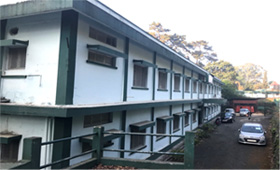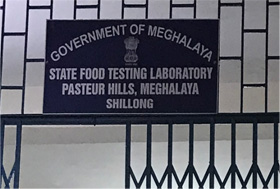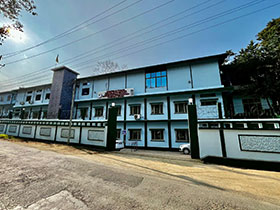- Government of Meghalaya

 Pasteur Hills, Meghalaya, Shillong was set up in the year 1981.Pasteur institute was established in 1915. The laboratory started as combined Food & Drug Laboratory, as to cater to the needs of the public and society, which laid by the Government of India in statutory guideline viz; Prevention of Food Adulteration Act 1954. Later with the implementation of Food Safety and Standard Act.2006, with effect from 5th August 2011 the Food Testing Laboratory is separated and functions as State Food Testing Laboratory, Pasteur Hills, Shillong under the Commissionerate of Food Safety, Meghalaya, Shillong.
Pasteur Hills, Meghalaya, Shillong was set up in the year 1981.Pasteur institute was established in 1915. The laboratory started as combined Food & Drug Laboratory, as to cater to the needs of the public and society, which laid by the Government of India in statutory guideline viz; Prevention of Food Adulteration Act 1954. Later with the implementation of Food Safety and Standard Act.2006, with effect from 5th August 2011 the Food Testing Laboratory is separated and functions as State Food Testing Laboratory, Pasteur Hills, Shillong under the Commissionerate of Food Safety, Meghalaya, Shillong.

The Food Testing Laboratory consists of three units:
i. Microbiology unit: It is a testing unit used to detect the bacteriological contamination of Food and water samples brought to the laboratory in order to know if the samples are free from any microbiological contaminant or presence of pathogens. This unit helps us to determine whether the food sample is safe and fit for human consumption. The unit have also been handling food poisoning and other food outbreaks cases in Meghalaya.
ii. Chemical unit: The unit basically analyzes the chemical content or concentration including the pH present in the various food products and water samples
iii. High End Equipment (HEE) unit: It is an analytical equipments used to identify compounds at trace level (at very low concentration upto parts per billion or parts per trillion). The instruments used in High End Equipment are:
 ICPMS – inductively coupled plasma mass spectrometry is an analytical technique that can be used to measured elements (heavy metals) at a trace level in food sample. Elemental analysis in food and water samples
ICPMS – inductively coupled plasma mass spectrometry is an analytical technique that can be used to measured elements (heavy metals) at a trace level in food sample. Elemental analysis in food and water samples LC-MS/MS – Liquid Chromatography with tandem mass spectrometry is an analytical technique used to separate, identify or quantity each component in a mixture. LC-MS/MS is for polar compound analysis in food samples. LC-MS/MS is for non-polar compound analysis in food samples
LC-MS/MS – Liquid Chromatography with tandem mass spectrometry is an analytical technique used to separate, identify or quantity each component in a mixture. LC-MS/MS is for polar compound analysis in food samples. LC-MS/MS is for non-polar compound analysis in food samples  GC-MS/MS – Gas Chromatography mass spectrometry is an analytical method that combines the features of gas chromatography and mass spectrometry to identify different substances within a test sample
GC-MS/MS – Gas Chromatography mass spectrometry is an analytical method that combines the features of gas chromatography and mass spectrometry to identify different substances within a test sample The first of its kind; ‘Food Molecular Microbiology Lab.,’ was inaugurated on the 17th January 2024 in the NER, India. Each room of this new testing centre is strategically designed and equipped to facilitate specific tasks, ensuring efficiency, accuracy, and adherence to stringent safety and cleanliness standards.
The first of its kind; ‘Food Molecular Microbiology Lab.,’ was inaugurated on the 17th January 2024 in the NER, India. Each room of this new testing centre is strategically designed and equipped to facilitate specific tasks, ensuring efficiency, accuracy, and adherence to stringent safety and cleanliness standards.
Component –
Impact – Enhanced Food Safety: –
Comprehensive Testing Capabilities: –
Caters to various food poisoning and food outbreak cases within the state.
Nothing of this is indeed possible without the support of FSSAI; the parent department of Food Safety. It’s true; every state including the state of Meghalaya started the journey in Food safety in a very small way. However it is FSSAI who ensure that food safety is a priority for our people and the entire health status of the state depends on the safety of our food.
With the introduction of this new centre, the laboratory now has the potential for organic testing certification, besides; the laboratory is already equipped with chemical testing, pesticides testing and heavy metals respectively.
This centre can cater to food poisoning and food outbreak cases within the state in a shortest possible time.
Instills trust in the local food supply as consumers are assured of rigorous testing standards.
Boon to our locally manufacturers food manufacturers who aim to promote their food products.
Potential for being a referral laboratory on biological discipline.
In summary, the impact of the Food Molecular Microbiology Laboratory is multifaceted, encompassing health, consumer confidence, economic support, and overall community well-being.